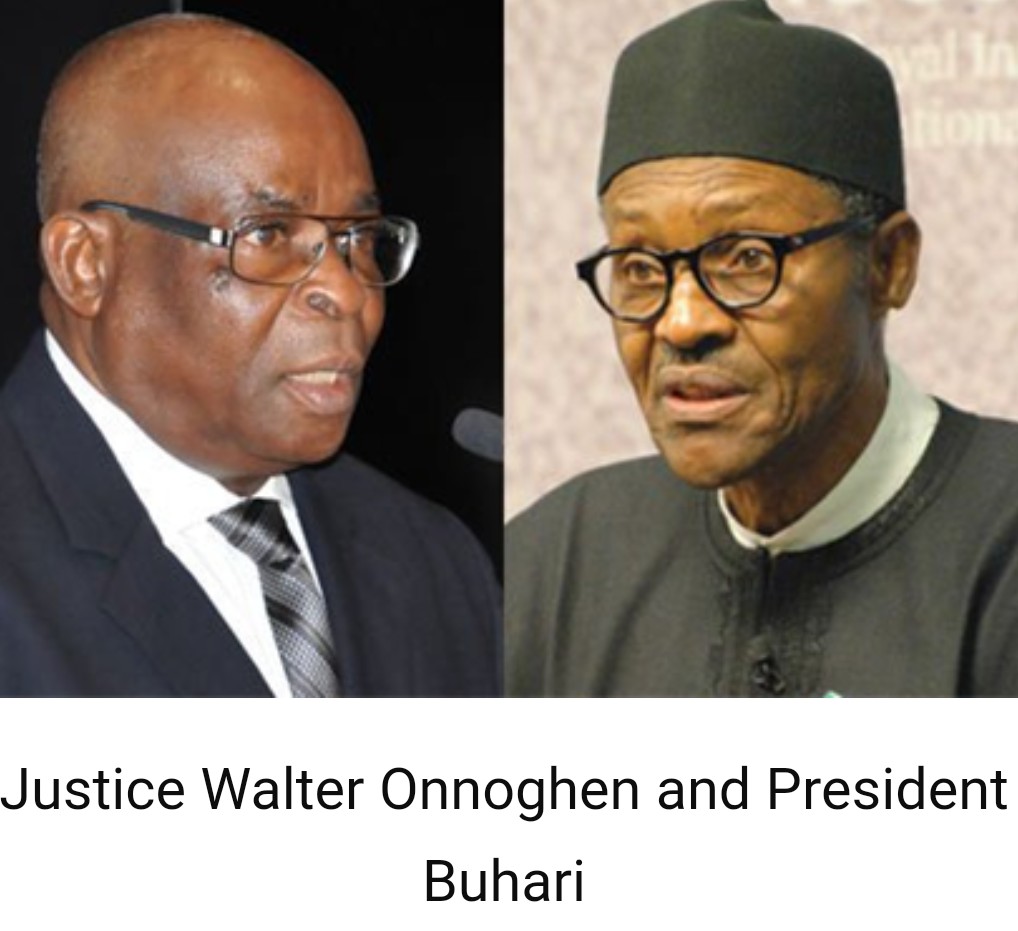By CrossRiverWatch Admin
The Chief Justice of Nigeria, CJN, Justice Walter Onnoghen, on Monday, challenged the jurisdiction of the Code of Conduct Tribunal, CCT, sitting in Abuja, to try him over his alleged failure to declare his assets.
The CJN, who stalled his planned arraignment following his refusal to appear before the Justice Danladi Umar’s led three-member panel tribunal, was however represented by a consortium of 89 lawyers that comprised of 46 Senior Advocates of Nigeria.
The legal team, which was led by a former President of the Nigerian Bar Association, NBA, Chief Wole Olanipekun, SAN, and a former Attorney General of the Federation and Minister of Justice, Chief Kanu Agabi, SAN, told the tribunal that their appearance at the proceeding was “in protest.”
Olanipekun told the tribunal that the CJN has already filed a motion dated January 14, to challenge the jurisdiction of the tribunal to hear the charges FG levelled against him. “My lord, we are not just challenging jurisdiction, we are even challenging the jurisdiction of this tribunal to even sniff that charge. We have served the Complainant/Respondent”, Olanipekun submitted. Though the said motion was not moved, nevertheless, a member of the team who spoke to Vanguard on condition of anonymity, said the CJN would capitalise on FG’s failure to channel the petition against him, as well as the outcome of the investigation that was purportedly conducted on his assets declaration forms by the Code of Conduct Bureau, CCB, to the National Judicial Council, NJC, before it rushed the case to the CCT. The CJN is contending that FG’s failure to abide by existing judicial precedent as encapsulated in a recent Appeal Court’s decision in Nganjiwa vs Federal Republic of Nigeria (2017) LPELR-43391(CA), to the effect that any misconduct attached to the office and functions of a judicial officer, must first be reported to and handled by the NJC, pursuant to the provisions of the laws.
He argued that only after the NJC has pronounced against such judicial officer could prosecuting agencies of the Federal Government proceed to initiate a criminal proceeding. Consequently, placing reliance on a recent decision of the CCT on a similar charge FG lodged against another Justice of the Supreme Court, Sylvester Ngwuta, the CJN’s legal team, maintained that FG’s decision to sideline the NJC, stripped the tribunal of its jurisdiction to entertain the instant case.
Meanwhile, shortly after the charge marked CCT/ABJ/01/19, was called up at exactly 10am, Chairman of the tribunal, Justice Umar, demanded to know why the CJN was not in court and if he was served with the charge.
Responding, a former Commissioner of Justice in Kano State, Alhaji Aliyu Umar, whom FG engaged to head its five-man prosecution team, told the tribunal that the CJN was served through one of his personal assistants. He said: “When we went to his house, he directed his personal assistant to collect the charge on his behalf. His personal assistant endorsed it, so he has been served.”
Olanipekun immediately countered the prosecution and challenged the competence of the service of a criminal charge on anybody aside the defendant himself.
He insisted that under sections 123 and 124 of the Administration of Criminal Justice Act, ACJA, 2015, the charge ought to have been served on the CJN personally, except when there is an order for substituted service. Not swayed by Olanipekun’s argument, FG’s lawyer, Umar, insisted that the CJN could not file an application to challenge jurisdiction of the CCT in absentia “It is our position that there is no law that says that a defendant can refuse to appear before the court. He should be here to take his plea first before raising any application.
“He has been summoned to appear before a court of law, he should be here before he can register his protest. This is a quasi-criminal matter and under section 396 of the ACJA, no motion can be heard in the absence of the defendant”, the prosecution insisted.
However, after a clerk of the tribunal, following a query from the Chairman, confirmed that the charge was received on behalf of the CJN, by one Sunday O.
Osai who was identified as his assistant, FG’s lawyer applied to be allowed to effect another service of the charge on Justice Onnoghen. “We apply that the service be done again with instruction from the tribunal that it must be personal and should not be handed to another person apart from the CJN”, the prosecution added.
Meantime, before the matter was adjourned till next week Tuesday, Justice Umar queried to know if the essence of the service was not to draw the attention of the CJN to the fact that a charge has been entered against him.
In his response, Olanipekun maintained that under the law in operation in Nigeria, every defendant must be personally served with the charge against him and equally afforded adequate time and facilities to prepare for his defence. “Our appearance here today is on protest by virtue of our application. We are not here because of arraignment,” he added.
Aside allegation that he failed to disclose his assets as prescribed by law, FG, in the charge that was filed by the Code of Conduct Bureau, CCB, accused the CJN of operating foreign bank accounts.
The prosecuting agency alleged that contrary to relevant laws regulating conduct of public office holders, the CJN, maintained a domiciliary foreign currencies account that comprised of Dollars Account, Pound Sterling Account and Euro Account.
Meantime, a group of lawyers, on Monday, besieged the CCT premises to protest the planned arraignment of the CJN. The protesters brandished several placards with inscriptions like: “No to intimidation & Stiffling of our Democracy”, “Avoid A Constitutional Crisis”, “You Cannot Manipulate the Judiciary”, “No to Assault, Intimidation and Desecration of the Judiciary”, “Respect the Rule of Law & Separation of Powers”, among others.
Culled from Vanguard Newspaper
